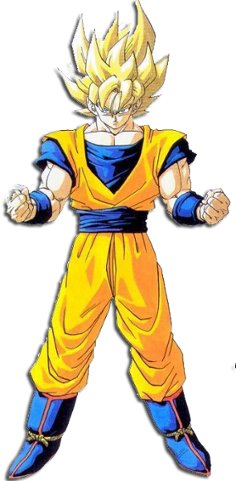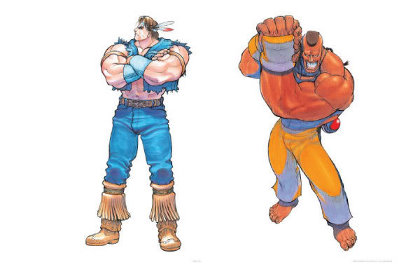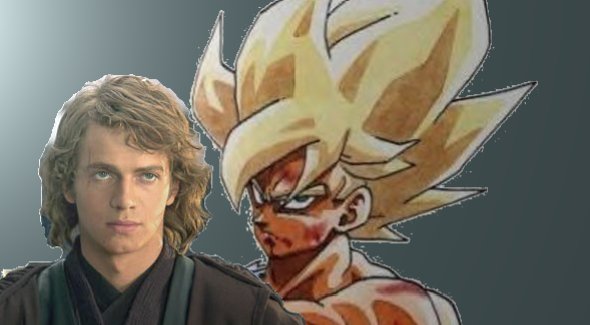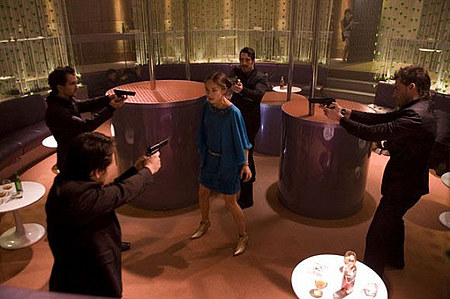The Super Saiyan Apotheosis
 Well, I should say, Dragon Ball is “about it” to an extent, but it comes down strongly against the idea of a Chosen One – of somebody designated by fate or destiny or even King Kai – having greater bearing on events than someone who is simply driven and motivated enough to work for it. Vegeta may be a prince destined to be strong, but it is his pride, not his lineage, that sustains him and keeps him going (as he gets his ass kicked again and again).
Well, I should say, Dragon Ball is “about it” to an extent, but it comes down strongly against the idea of a Chosen One – of somebody designated by fate or destiny or even King Kai – having greater bearing on events than someone who is simply driven and motivated enough to work for it. Vegeta may be a prince destined to be strong, but it is his pride, not his lineage, that sustains him and keeps him going (as he gets his ass kicked again and again).
In Dragon Ball, there is a myth of a Chosen One – The Super Saiyan, a mighty alien warrior who is unbeatable in combat and thus capable of establishing primacy across the galaxy. Through one of the major story arcs (and, some would argue, the best saga in the series), three different characters vie for this primacy.
Frieza – An arrogant intergalactic dictor with tremendous strength. He believes other people in general have little potential of consequence, especially relative to him.
Vegeta – An arrogant Saiyan Prince who believes he is the Chosen One, the coming Super Saiyan who will depose Frieza and rule the galaxy. He believes in destiny and station; that people cannot change their nature.
Goku – A well-meaning fellow who does a lot of push ups and primarily fights to save his friends and because he enjoys the challenge of it. He believes that individuals have great capacity for change.
Vegeta’s death at the hands of Frieza ties together the different plotlines and ideas of destiny very nicely —
http://www.youtube.com/watch?v=cF-dhJSNT8s
One of the great lines in this scene (and I think the scene has a lot of pretty great lines, although the pacing, as it always is with the TV show, is more than a bit off), comes after Vegeta dies, when you see Goku’s shadow over him.
“I’m the only one left.”
Not the Chosen One. Not the Super Saiyan. When a character in Dragon Ball says he fights because no one else will, or can, it’s usually because that character is dead or incapable of fighting (or too weak to matter).
These are all better reasons than the Chun-Li reason referenced at the top of this article. I didn’t see the Kristen Kreuk Street Fighter movie, but I was kind of hoping you’d see other people fight Bison too – see a match with Blanka, then a match with Dhalsim, etc. I mean, hypothetically, if Chun-Li decides not to go fight, there are a bunch of other folks who are more than willing to do it, all the way down to Dee Jay and T. Hawk.
Yes, Goku in Dragon Ball goes through an apotheosis where he is recognized as a special, singular individual and transforms into a hero of prophecy and destiny – but he is only able to do it because he rejects prophecy and destiny. It’s one of the great ironies of the series (and one of the structural elements of the underlying ideology of it that I find especially compelling).
Prophecy and destiny are revealed for what they are – an historical notion of what is possible, which should be listened to because of history’s tendency to repeat – or, as I’ve heard, “rhyme” with the past.

Sorry, I couldn't resist putting in a picture of Dee Jay and T Hawk (not necessarily in that order).
To complete the cycle, here’s Goku’s major apotheosis – it’s another case of a well-used motif – Vegeta dies at Frieza’s hands, telling Goku about their exploded planet, then Krillin is exploded in the sky, combining and reimagining the notion of a ravaged home. At Vegeta’s death, Goku takes on a heroic mantle of vengeance, his best friend Krillin is killed (an act that makes God himself shudder with helplessness), and Goku becomes something else —
http://www.youtube.com/watch?v=mKir_imxqV8
The main things to take away from this concerning Chosen Ones and the topic at hand here are:
- Goku has a reason for his tranformation that has nothing to do with destiny. (“I won’t let you get away with this.”)
- Nobody informs him that he has to transform, or tells him that he really ought to do it – you get to see the character take the action organically.
- Because nobody is clogging up the scene with nonsense about “MAKE A CHOICE” or “IT IS YOUR DESTINY!” the moment has a lot more dramatic and almost lyrical complexity. There’s an overlay of Goku’s responsibility for his birth world and his adoptive world (again, set up as so many things in Dragon Ball, by motif).
- There’s the question of how much active agency he actually has, which doesn’t really need to be identified right on the nose (and it cheapens it to do so).
- It’s a character-building moment for Goku. We see him in a somewhat unguarded moment doing things entirely from his internal motivations. Toriyama further refutes the idea of destiny and a Chosen One by having many characters make this same transformation later on in the piece – but it’s important to note that no two of them go through their first transformation in quite the same way.
- And most elegantly, it is done very efficiently, without much wasted dialogue. You don’t have to actually explain the things that are going on. It is enough to show them, as long as you have compelling character design.
So, let’s expand this away from Dragon Ball a bit.


Good read!
I wonder how much, if at all, Terminator Salvation will touch on the chosen one aspect of John Connor. I haven’t really followed the Sarah Connor Chronicles (and after reading all the praise on here, I probably should) but I think I remember John Connor at some point throwing the idea out there that what happens if he refuses to lead the resistance. Does the “chosen one” have a choice in the matter? All the movie examples put forth here would seem to say no (Star Wars, Matrix, even Dragonball).
Anybody have any movies or literature where the “chosen one” goes against the prophecy?
JoeMc, it’s been a while since I read it (and the series won’t end for a while yet, so I’m not sure how the issue will be resolved) but as I recall the Wheel of Time books deal with this issue pretty extensively. Plus they’re a pretty fun read. I’d recommend checking them out if you haven’t, although you might just wait until 2011.
Great piece Fenzel!
I think the reason Star Wars absolutely nails the “chosen one” idea, in the entirety of its six episodes, is Lucas allows the characters to make their own guesses as to how the prophecies play out. Anakin is the chosen one who will bring order and balance to the force, but unfortunately for the Jedi THEY are the one’s unbalancing the good vs. evil teeter-totter of the Force. Thus Anakin DOES fulfill his prophecy, but in a way the Jedi didn’t expect, by killing these hundreds of Jedi and then, later, killing the Emperor. But the key here is we are mistakenly led by other characters to believe something different than what actually happens: in the original trilogy, we believe that Luke is the chosen one because Yoda and Obi-Wan tell him this, only to find out that it is Vader who kills Palpatine, while in the prequel trilogy, those without the knowledge of the original movies believe Anakin will be good because many of the other characters believe this, only for him to become evil. It’s a great bait and switch, both times!
“DESTINY! DESTINY! NO ESCAPING THAT FOR ME!”
Seriously, though, great article, Fenzel. I especially liked this part: “You are hamstringing yourself with a very specific ideology.”
It’s not only an ideology that demands the universe has a “chooser” to pick the chosen one. It’s also an ideology that is clearly monarchical in nature. As I said back in my Pan’s Labyrinth post, the hero’s/chosen one journey comes from King Arthur-type legends and is a justification for the rule of an authoritarian leader. In other words, “You have to listen to me, your king, because I am the Chosen One who pulled the sword from the stone and defeated the old evil king/empire/Saiyan. I also have magical powers.”
This is not to say that I’m against prophecies in all texts, however. Actually I still adore the old Greek tragedy notion of the misunderstood prophecy. (Jonathan hit the nail on the head with the Star Wars trilogies. Those prophecies worked because they played out in surprising ways.) The problem is that prophecies have been so overused lately. But if you do something different with them, like Rowling does in Harry Potter, they can still surprise.
@JoeMC
There are lots of movies where the Chosen One goes against the prophecy, and most of the time in those cases, the prophecy carries some pretty severe drawbacks, up to and including the destruction of the universe.
Three fun movies that explore this sort of scenario –
Hellboy
The Devil’s Advocate
The Last Temptation of Christ
Then of course, there’s _Good Omens_ by Terry Pratchett and Neil Gaiman, which gets a lot of mileage out of this idea. I heartily recommend it.
@Fenzel: One of my favorite shirts in 7th grade had that first full-body shot of Goku as SS on the front (and that’s it). Nostalgia…
Anyhoo, awesome post, and great job at tying it in with the Popular Culture in general. I couldn’t agree with you more when you list off why it does and doesn’t work. One notable aspect about the SS prophecy in particular is how Vegeta is willing to accept it isn’t about him. He passes the torch off to Goku as he dies, and thus lets go of that pride you mentioned- at least, for the moment. But his entire life, up until that moment, had been his quest to become a Super Saiyan. I think that also has something to do with why Goku forgives him.
I’d like to nit-pick a little, though. I have not read any _Spider-Man_, so correct me if I’m wrong, please. But, it’s my understanding that he becomes what he becomes through an “organic” transformation (sort of like Goku’s)- something happens and he makes the choice to become Spider-Man. No one tells him he *must* do it and has no say in the matter. So, are you saying the circumstances of Peter Parker’s “transformation” were SO constricting that he may as WELL have been told it was prophecy? Otherwise, I’d say his is even less like Han’s or Neo’s than Goku’s is.
@Mlwaski: I think your last post and the part about dramatic irony fit into the discussion- the reason those prophecies in ancient Greek tragedies work is their dramatic irony, as you say. I suppose for _Dragonball_, the dramatic irony is Goku’s oblivion/disinterest with regards to the prophecy while it’s kind of obvious to the audience that he’s going to be a SS. This, of course, makes the prophecy work and not feel *too* cliche. And it’s also sort of dramatic irony that Vegeta strove his whole life to fulfill the prophecy, even though, again, the audience is able to tell he’s not “it” the whole time (or at least up until the first SS transformation in the series). (BTW, Neville ended up being one of my favorite _HP_ characters.)
(Oh, and Fenzel, a kernel for a post about race and _Dragon Ball_: Why are Super Saiyans blonde-haired and blue-eyed?)
Buffy always seemed to make prophecy interesting.
I was starting a really long comment about Buffy and how even though she’s a “Chosen One”, she’s more like Goku than Luke, Neo, or Harry Potter, but I realized it was going to get a little out of hand, so I think I’ll just blog on my own time about how Buffy chooses to be chosen, which I think is a process that determines whether or not the device of the “Chosen One” is earned or not. Kind of like what JoeMc said about John Connor.
Hmm. Long sentences happen at 3am.
Anyway, I also think there’s something to the finite destiny versus the continuous destiny thing that’s mostly divided along the film/TV (or comic) line.
By “Han” I meant “Luke.”
Although now that I think about it, the fact that it ended up being Anakin anyway while he had never actually been told the prophecy (right?) makes it a little awkward. Still, I think Peter’s status is more chosen by Peter than Neo’s and Goku’s, since he isn’t operating under any prophecy.
@Lauren —
When you finish the post, send it my way! I’ll link to it! I’d love to read it!
Hey I’m mentioned in here! Thanks for including me!